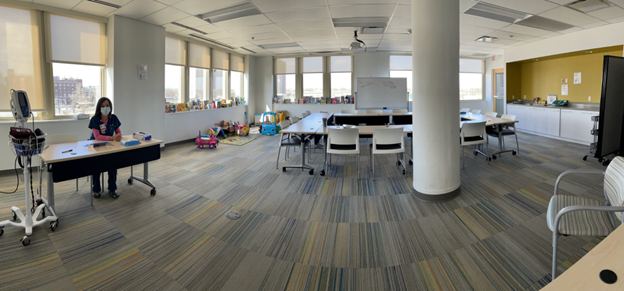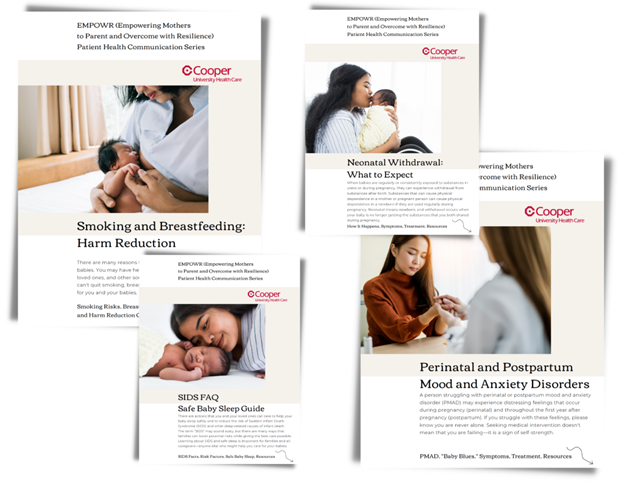This week is National Drug and Alcohol Facts Week® (NDAFW), an observance that encourages dialogue surrounding substance use and substance use disorder (SUD). This year for NDAFW, the Cooper University Health Care Center for Healing, a State of New Jersey-designated Medication for Addiction Treatment Center of Excellence (MATCOE), will share content to educate providers, interdisciplinary care teams, patients, and communities across Cooper, the region, and the state on SUD and available treatments at Cooper. Please follow Cooper‘s eHealth Blog and MATCOE social media networks for daily updates on Twitter, LinkedIn, and Instagram.
Empowering Mothers to Parent and Overcome with Resilience
In 2016, the Center for Healing established the Empowering Mothers to Parent and Overcome with Resilience (EMPOWR) program for pregnant and parenting women struggling with substance use, led by Kaitlan Baston, MD, MSc, DFASAM, Head of the Center for Healing, and Iris Jones, LPC, LCADC, NCC, CCS, Clinical Operations Manager and Therapist at the Center for Healing. Funding from the New Jersey Division of Mental Health and Addiction Services was awarded in 2017, enabling the center to expand the program by providing wraparound services including medication gap coverage, recovery-focused housing, legal services, transportation, and essential baby items.

Carla Noguera, CMA, Ambulatory Operations Manager at the Center for Healing, in the patient medical group room used for the EMPOWR program, at the Bridgeview Building.
The community-based program focuses on “empowerment through empathy,” with an understanding that families deserve access to care that is free from stigma and judgment. Any pregnant person struggling with substance use or substance dependence can receive immediate treatment access at all Center for Healing locations or within the Cooper Emergency Department. The interdisciplinary clinical team, led by the center’s Clinical Practice Supervisor, Lindsay Wilson, LPN and Ambulatory Operations Manager, Carla Noguera, CMA, provides exemplary care in an environment that is safe for all patients and their children.
Further, across 2021 and 2022, as part of the EMPOWR program, bilingual health promotion and a health communication series on topics including and not limited to smoking and breastfeeding harm reduction, neonatal withdrawal, and perinatal mood and anxiety disorders were created as part of a center content and clinical collaboration. The team is currently creating a collated book encompassing the series, with creation of further educational information and resources. Resources are available for all patients at the center, disseminated across partnering clinical practice sites and available at cooperhealth.org/recovery, and proliferated as part of Southern New Jersey Medication for Addiction Treatment Center of Excellence (MATCOE) networks.

Center for Healing patient-facing health communication resources were created for the Empowering Mothers to Parent and Overcome with Resilience (EMPOWR) program by the center’s Content Manager, Patricia Fortunato, with multidisciplinary clinical expert insight from center Clinical Practice Supervisor, Lindsay Wilson, LPN; Clinical Operations Manager and Therapist, Iris Jones, LPC, LCADC, NCC, CCS; and Center Head and Medical Director of Government Relations, Kaitlan Baston, MD, MSc, DFASAM. Resources are available at cooperhealth.org/recovery.
Perinatal Substance Use Research Initiatives
The Center for Healing conducted a retrospective study of 140 pregnant and postpartum women in order to examine if the EMPOWR clinical model results in improved outcomes for patients. The study was published in the Journal of Addiction Medicine in September of 2021, examined program retention amongst pregnant and postpartum women with substance use disorder (SUD) from November 2016 to March 2020, and found that over 97% of patients were prescribed MOUD and 88% of all urine toxicology results were negative for non-prescribed opioids. The study also showed that when patients were able to engage in a wraparound care model, they were less likely to disengage from treatment.
Neonatal Education, Support, and Treatment
The Center for Healing assisted with the creation of the Neonatal Education, Support, and Treatment (NEST) program, a quality improvement (QI) initiative to advance the care of substance-exposed infants (SEI). An interdisciplinary team of physicians, therapists, nurses, and patients in recovery worked to redesign the treatment of neonatal withdrawal into a family-centered model based on research out of Yale University by Matthew Grossman, MD. By focusing on non-medication interventions, such as decreasing stimulation, rooming-in, mother–infant bonding, and breastfeeding, this initiative decreased the percent of infants requiring medication for withdrawal from 86.7% to 19%, and decreased the average length of stay for SEI from 26.9 days to 9.6 days.
In response to these improved outcomes, Dr. Baston, Charlotte Nussbaum, MD, and Iris Jones partnered with Rutgers University to oversee a statewide telementoring program, Project ECHO (Extension for Community Healthcare Outcomes). The program provided education to birthing hospitals in hopes of improving the treatment and care of SEI. The series addressed a myriad of topics, including initiating the Eat, Sleep, Console (ESC) model for the treatment of neonatal withdrawal, rooming-in protocols for breastfeeding, family-centered care models, and the management of pregnant and parenting people with SUD in a hospital-based setting. QI work for SEI is ongoing at Cooper, and in 2022, focused on the creation of hospital-based, patient-centered care agreements to support pregnant people with SUD.
